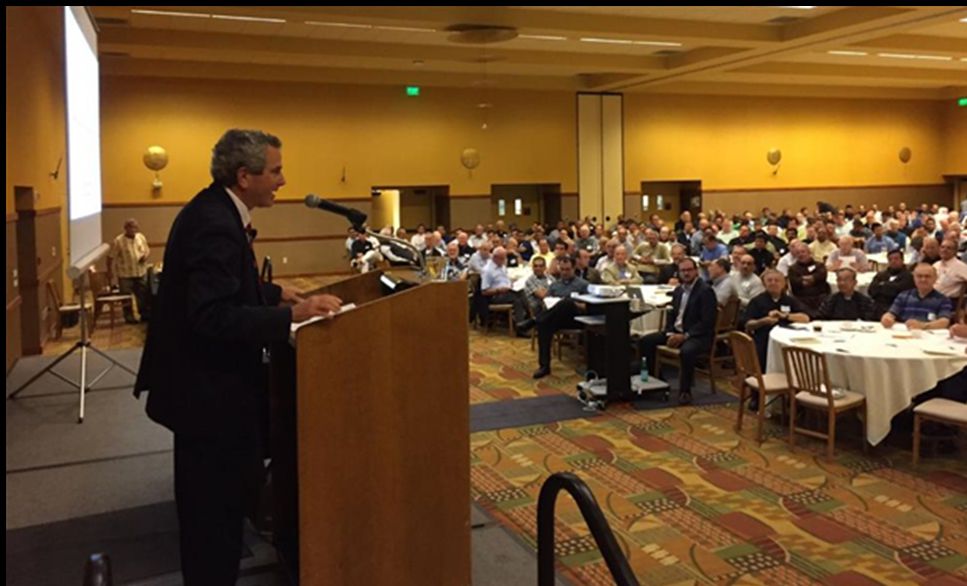Failure to engage in end-of-life conversations has contributed to a health care crisis of people dying badly and has fueled physician-assisted suicide laws.
Ira Byock, M.D., founder and chief medical officer of the Providence Institute for Human Caring, delivered this sobering assessment earlier this month before 700 clergy at the Archdiocese of Los Angeles’ annual Presbyteral Day, which included Archbishop José Horacio Gomez, the nation’s highest-ranking Hispanic bishop.
Until we change the conversation to focus on advanced care planning and shift resources to affordable, accessible quality palliative and hospice care, Dr. Byock said, society risks slipping toward a normalization of euthanasia, much like has been seen in the Netherlands, where people with depression and other ailments can legally end their lives.
“Those with dementia will be the target for physician-assisted suicide and euthanasia,” said Dr. Byock, who has opposed doctor-assisted suicide for some 35 years. “But I want to change the conversation to show the public what we’re for.”
This includes more palliative care instruction at medical schools, better and proper staffing at nursing homes, living wages for caregivers, and a relentless, compassionate emphasis on completing advance health care directives.
After showing a “Conversation Sabbath” video, he challenged priests to carry advanced care planning conversations to their congregations and, first and foremost, to complete an advance directive themselves.
“People get scared when you ask if they have an advance directive,” Dr. Byock said. “But we should be modeling behavior we want to see in the people we serve. We should be able to say, ‘We do this for everyone. I have an advance directive on file, and so does every adult in my family.’
“And for a physician, asking a patient about whether they have an advance directive should be as routine as asking what medications they’re currently taking.”
Drawing from anthropologists, bioethicists, and leading Catholic thinkers, Dr. Byock built a historical, medical and moral case for caring for those with serious illness, not killing them.
He noted that anthropologist Margaret Mead considered the earliest evidence of civilization was a human thighbone with a healed fracture that had been excavated from a 15,000-year-old site. “For an early human being to have survived a broken femur, living through the many weeks required for the bone to heal, the person had to have been cared for — sheltered, protected, brought food and drink,” Dr. Byock said.
He cited the late Dr. Edmund Pellegrino, who served as the 11th president of the Catholic University of America, from whom he learned fundamentals of clinical ethics and virtues of health care.
And he quoted early 20th century Harvard surgeon Dr. Francis Peabody:
“One of the essential qualities of the clinician is interest in humanity, for the secret of care of the patient is in caring for the patient.”
Dr. Byock delineated core tenets of human caring including:
- rn
- Shelter from the elementsn
- Provision of hygiene
- nAssistance with elimination
- nOffering of food and drink
- nKeeping of company
- Alleviation of symptoms and suffering
rn
rn
rn
rn
rn
rn
Only the last item requires skilled medical treatment, licensure, certifications, and prescriptive authority.
“The laws that have legalized physician-assisted suicide changes have resulted in no improvements in health care.” He said, “Instead, these laws reflect a capitulation to failures of the health care system. We are called to respond to suffering people. However, alleviating suffering is different than eliminating the sufferer. It may seem a fine line to some, but if so, it’s a very bright line.”
He held up as a model of enlightened care Providence Mount St. Vincent in Seattle, where a preschool is integrated to a nursing home.
Byock and the team he leads at the Institute for Human Caring is spearheading a culture change at Providence St. Joseph Health, the nation’s third-largest nonprofit health care system, to inculcate advance directives and whole person care — bringing the knowledge and skills of palliative care to all patients across all care settings.
“People are inherently dignified. Dying with dignity doesn’t mean you have to die with your boots and makeup on,” Dr. Byock added. “People who are dying should be able to see their intrinsic dignity reflected in our loving eyes. In today’s world, some of us will practice and minister in states in which physician-assisted suicide is legal. However, people who are confident of being well cared for — relatively comfortable, but also wanted and worthy of care — are far less likely to ask us to hasten their deaths.”

